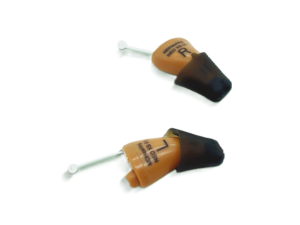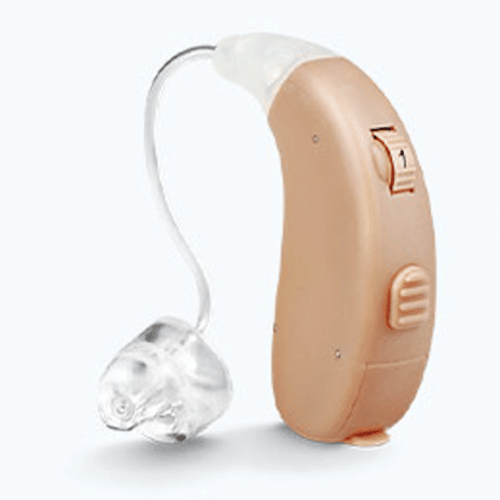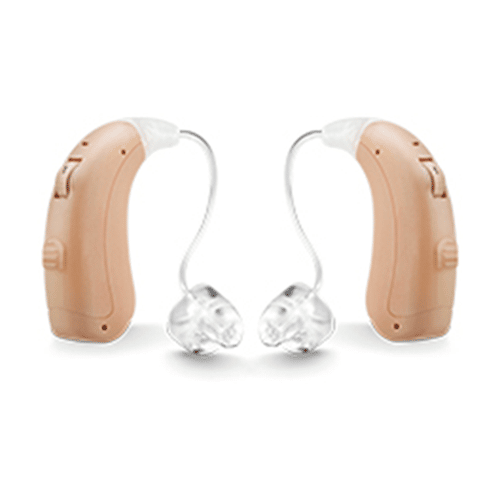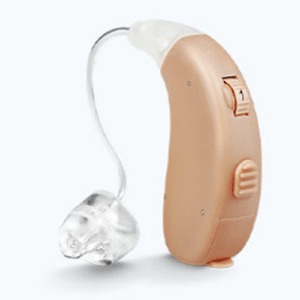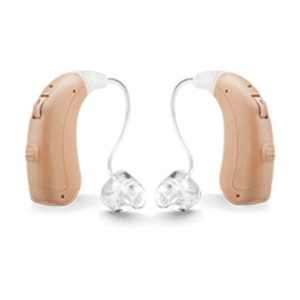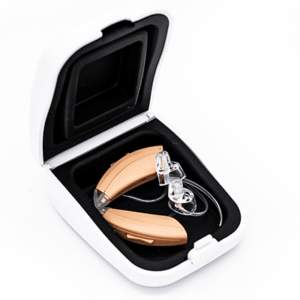- Cost per pair: $297
- Hearing aid type: In-the-canal (ITC)
- Dimensions: 0.5 x 0.875 inches (width x length)
- Weight: 0.95 ounces
MDHearing Aids Review 2025: Our Experts Tested
Key Takeaways
- MDHearing hearing aids range from $999–$2,399 per pair, but are often on sale for $297–$699 per pair, depending on the hearing aid.
- The company has an online hearing test, and free audiologist and hearing aid professional support.
- MDHearing offers three behind-the-ear (BTE) hearing aids, one completely-in-the-canal model, and one in-the-canal (ITC) model designed for mild to moderately severe hearing loss.
Having high-quality and affordable hearing aids is crucial to many people, especially when many hearing aids cost an average of $4,600. [1] Obama White House Archives. FDA Takes Action to Deliver Lower-Cost, Innovative Hearing Aids to Millions More Americans. Found on the internet at https://obamawhitehouse.archives.gov/blog/2016/12/07/fda-takes-action-deliver-lower-cost-innovative-heari Our team mystery shopped MDHearing hearing aids to find out whether the company’s budget-friendly prices can go hand-in-hand with quality and durability.
Our team subjected the behind-the-ear MDHearing VOLT MAX hearing aids to a number of hands-on tests. This included testing the device’s IP rating, which specifies how much dust and water exposure the hearing aid can tolerate. We tested the VOLT MAX’s IP rating by submerging it in three feet of water for 30 minutes. The hearing aids’ functions (including Bluetooth connectivity) weren’t affected at all by the water test.
We also spent time reviewing the pros and cons of all MDHearing models, tried the online hearing test, and broke down other important details, such as warranty, payments, customer service options, and trial period. Finding the best hearing aid can be a long process, and our hope is to help you narrow your search and identify whether MDHearing is right for you.
Why trust our expert review?
Our team recommends products and services we believe will provide value in the lives of our readers. We’ve spent more than 5,000 hours conducting in-depth research on hearing aid devices to give you the most accurate hearing aid review. To make these selections, we:
- Consulted with audiologists and geriatric care experts
- Mystery shopped 18 brands
- Surveyed hundreds of hearing aid users
- Tested various models of hearing aids
- Interviewed experts in the field
- Read thousands of verified customer reviews
Read more about our hearing aid review methodology.
Pros and cons of MDHearing
Table 1 Comparison of MDHearing hearing aids models, as of 2025
|
MDHearing NEO
Visit Site
|
MDHearing AIR
Visit Site
|
MDHearing VOLT
Visit Site
|
MDHearing VOLT MAX
Visit Site
|
MDHearing NEO XS
Visit Site
|
|
|---|---|---|---|---|---|
| Cost per pair | $297 | $297 | $397 | $699 | $397 |
| Type of hearing aid | ITC | BTE | BTE | BTE | CIC |
| Battery type | Rechargeable | Rechargeable | Rechargeable | Rechargeable | Rechargeable |
| Bluetooth | No | No | No | Yes | No |
| Water-resistant | Yes | No | No | Yes | No |
| Telecoil | No | Yes | No | No | No |
MDHearing Reviews
How much do MDHearing aids cost?
MDHearing aids cost between $999–$2,399 per pair but are often on sale starting at $297 per pair, depending on the device.
With price being the second most important factor for the majority of respondents to our team’s survey (behind only “easy to set up and use”), understanding what goes into the cost of hearing aids is key to determining which one will be best for you over the long run. Some hearing aids offer built-in technology like activity tracking for counting steps, Bluetooth connectivity for taking phone calls and streaming TV, or artificial intelligence that can detect falls.
“The cost of hearing aids is related to the level of technology, or in other words, how sophisticated the computer chip is on the inside of the device,” said Amy Sarow, a practicing doctor of audiology in Michigan.
Though MDHearing has Bluetooth connectivity, it is limited to the VOLT MAX, and it only connects to the MDHearing mobile app. It doesn’t allow for Bluetooth streaming with your TV, phone, or music.
How to save money on MDHearing aids
MDHearing often offers sales on its hearing aids, ranging from $297–$699 per pair. When we asked an MDHearing support team member how often the company has sales, they weren’t able to give us much information, except to say, “We come up with different promotions from time to time.”
If you’re considering MDHearing, check back on the website often to try to catch them on sale.
In addition to sales, you can also use money from a flexible spending account (FSA) or health savings account (HSA) to purchase hearing aids. The Internal Revenue Service (IRS) states the cost of hearing aids and batteries, repairs, and maintenance are considered medical expenses, which make them FSA- and HSA-eligible. [2] IRS. Publication 502. Found on the internet at https://www.irs.gov/pub/irs-pdf/p502.pdf.
If you’re a veteran or active duty military member, your VA benefits may cover medical services or hearing aid assistance. [3] VA.gov. VA Benefits. Found on the internet at https://www.va.gov/health-care/about-va-health-benefits. See the NCOA overview of veterans benefits you may be eligible for. Some labor unions also offer stipends to help pay for hearing aids.
There may also be unknown benefits you’re eligible for. Visit our Benefits CheckUp to learn more about benefits in your area that may be available to you.
Does MDHearing accept insurance?
Most insurance plans do not cover the cost of hearing aids, but there are some services you may be eligible for, like those covered by Medicare Advantage (Medicare Part C). [4] Medicare.gov. Medicare Advantage. Found on the internet at https://www.medicare.gov/Pubs/pdf/12026-Understanding-Medicare-Advantage-Plans.pdf. Check with your insurance provider to see what coverage is available.
MDHearing Aids online hearing test
Online hearing tests vs. in-person tests
Online tests can estimate the degree of your hearing loss and help you find the right type of hearing aid for your hearing loss. An important note is that online tests cannot diagnose the exact frequencies or cause of your hearing loss (for example, ear wax blockage versus permanent age-related changes). Research has shown that only in-person hearing tests can provide an accurate diagnosis, but online hearing tests can still serve as a reliable alternative for gauging the level of your hearing loss, but not the cause. [5] The Hearing Journal. Benefits of Home Hearing Test. Found on the internet at https://journals.lww.com/thehearingjournal/fulltext/2020/07000/benefits_of_a_home_hearing_test.9.aspx.
According to the American Speech-Language-Hearing Association (ASHA), during an in-person consultation, an audiologist will look inside your ears to determine whether there is a physical cause for your hearing loss, the severity of your hearing loss, and your best treatment options. [6] ASHA. Hearing Evaluation. Found on the internet at https://www.asha.org/public/hearing/hearing-evaluation. With an online hearing test, you must find a spot where you can keep your surrounding area as quiet as possible during the test, and your diagnosis is based on what can be found out using personal headphones, which can vary in quality.
Sarow noted that there are highly dependent factors for an online test, such as background noise, computer speakers, and more.
“Additionally, [online hearing tests] cannot determine whether hearing loss stems from the inner ear, or whether it may be due to ear infection or other cause (e.g., conductive or mixed hearing loss),” said Sarow.
MDHearing online hearing test
When a member of our team used the MDHearing online hearing test (see Figure 1), it took approximately seven minutes.
To take the online hearing test, you first will have to enter your name and email. Then, a series of prompts will ask you to verify that you’re in a quiet room and your volume is set to 100%. Next, you’ll test the level of volume on your left and right ears. After this initial set-up, the online test will walk you through six different sound settings for each ear, ranging from low- to high-frequency sounds.
Figure 1 Member of our team testing MDHearing online hearing test

Once you complete all 12 tests (six per ear), it will generate your results. On the results page (see Figure 2), you’ll see what your level of hearing is for each of your ears, from healthy hearing to profound hearing loss.
Figure 2 Example results page for MDHearing online hearing test

The results page also interprets your type of hearing loss (see Figure 3). The drop-down “read more” selections are helpful for learning more about what each frequency means for your hearing, with examples of difficult hearing situations (e.g., loss of hearing in the low frequencies will result in struggling to understand men’s voices).
Figure 3 Interpreting your results from MDHearing online hearing test

If you receive results outside of the healthy range, the results page will prompt you to connect with a hearing professional. You can schedule a free 40-minute appointment with an MDHearing professional (see Figure 4) by calling or texting 844-994-3270.
Figure 4 Image of consultation scheduling calendar

MDHearing aids mobile app
The MDHearing mobile app, available on Apple Store and Google Play, is currently only compatible with the VOLT MAX. The app allows you to connect to your hearing aids via Bluetooth to personalize your hearing aid settings, adjust the volume level, change to different listening environments (automatic, quiet, conversation, or restaurant), and request assistance from an MDHearing specialist to remotely adjust your hearing aids through the app.
If you notice issues, such as the volume is too soft, loud, or muffled, or if the background noise is too distracting, the app is a good tool for discreetly adjusting your hearing aids. If you want a hearing aid that has more advanced app capabilities, the downside of the MDHearing app is that you can’t use its Bluetooth technology to stream music, TV, or phone calls to the hearing aids.
Figure 5 Support section on MDHearing app
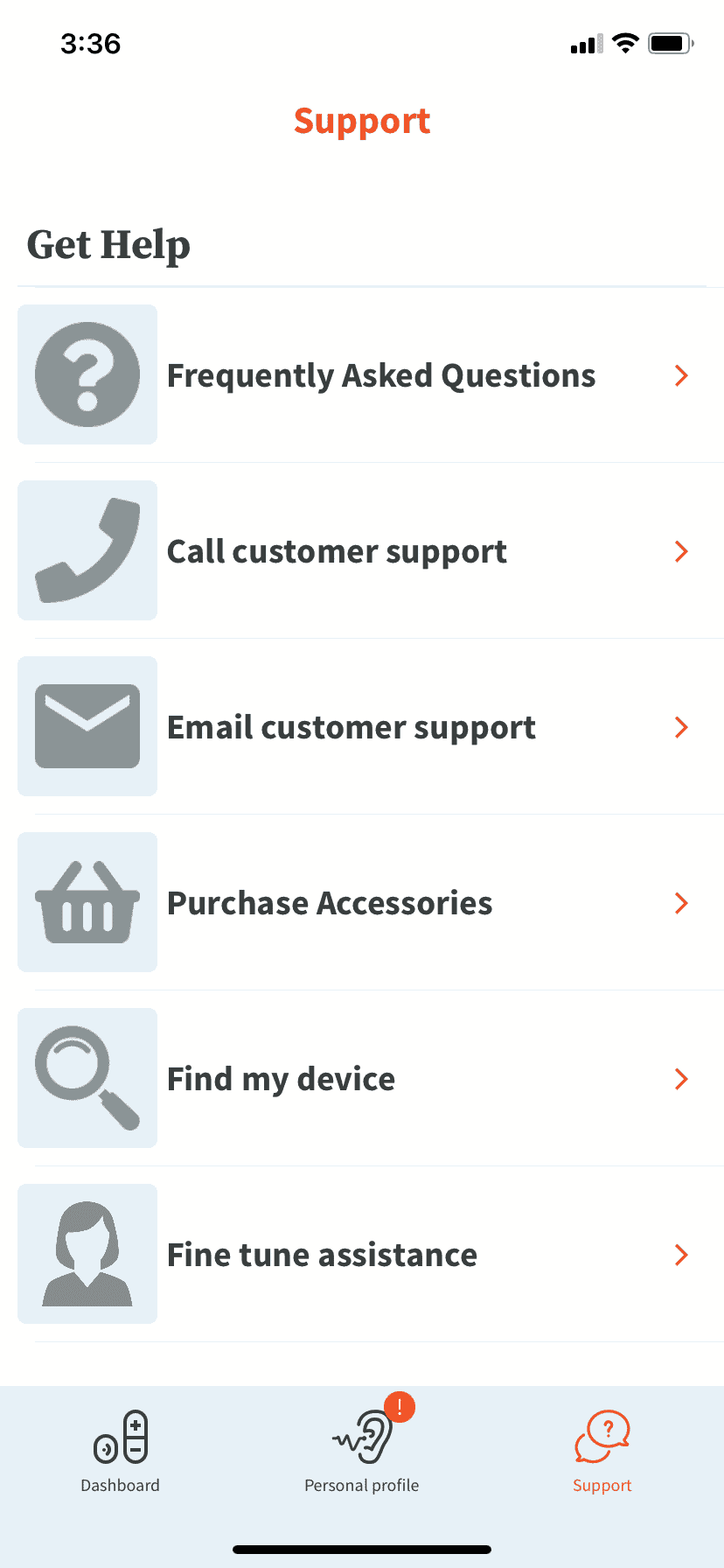
MDHearing customer service
You can reach MDHearing customer service by phone, email, or chat.
- Phone: 800-918-3914, 7 a.m. to 6 p.m. CT, Monday through Friday
- Email: support@MDHearingAid.com, available 24/7, responses take 24–48 hours
- Contact form: https://www.mdhearingaid.com/contact-us/
- Chat: On the lower-right hand corner of the MDHearing website, available 24/7
We contacted MDHearing support via the chat, and Sherryl L. was quick to respond. When she couldn’t find the answer to our question about the weight of the hearing aids, she asked for our name, email, and phone number to be contacted by a customer service representative. If you have a basic question, the support chat is helpful. If you have a difficult question, you’ll be rerouted to customer service via phone or email.
Figure 6 Example conversation for MDHearing chat

We also tried to contact MDHearing customer service by email. We received an immediate automated response of “request received,” and a response to our question almost 24 hours later. Our question about the weight of the hearing aids was answered, but only at the end of a sales pitch template, and not in the detail we hoped for. This kind of gap in service may be more common with OTC hearing aid companies compared to a local professional hearing aid fitting. Since new hearing aid users tend to encounter various questions and troubleshooting needs, a potential buyer should consider whether they are comfortable with delayed and/or limited support service. In contrast, visiting an audiologist provides a dedicated opportunity for learning about your hearing aid fitting, and a clear way to follow up with questions that may arise.
Shipping, payment, and financing options
To buy MDHearing hearing aids, visit the company website and select the model you’d like to purchase after you have completed the online hearing test and hearing consultation. Then, you’ll choose from the shipping options: first class, ground, 2nd day air, and next day air (see Figure 7).
Figure 7 Example of shipping costs for MDHearing aids

MDHearing accepts Paypal and all major credit cards: American Express, Discover, MasterCard, and Visa.
You also have the option to finance your purchase with Affirm and make monthly payments over 3, 6, or 12 months. For example, if you buy the MDHearing Air for $297 (for the pair), you can pay $99 per month for three months, $49.50 per month for six months, or $24.75 per month for 12 months. (By contrast, if you buy a pair of Air hearing aids at the full list price of $1,199.98, your payments would be $399.99 per month for three months, $199.99 per month for six months, or $99.99 per month for 12 months.)
Warranty and trial period
MDHearing warranty
MDHearing has a one-year warranty covering defects in parts, materials, and workmanship. The Volt Max has an extended two-year warranty. You can purchase a protection plan subscription, called MDShield, for an additional $9.99 per month. MDShield covers hearing aid repair for accidental damage, like water or pet damage, and defects or malfunctions past the standard warranty. It does not cover loss, theft, or unauthorized repairs. If MDHearing can’t fix your hearing aid, the company will send you a new device. MDShield can be canceled at any time by contacting customer support.
In our survey, 38.89% of the respondents who use MDHearing had to get their hearing aids repaired at least once during the warranty period. Although a majority of users (61.11%) didn’t need the repair service, if having a backup plan is important to you, purchasing the protection plan can be a reassuring investment.
MDHearing trial period
MDHearing offers a 45-day, risk-free trial and a 100% money-back guarantee. The company recommends giving yourself 45 days to allow your ears to adjust to the feeling of the new hearing aids and your brain to readjust to the sounds. For some users who are used to hearing at a reduced volume, a return to normal hearing can be uncomfortably loud.
If you aren’t satisfied after the trial, return the hearing aids by calling 1-800-918-3914 and asking for a Return Merchandise Authorization (RMA) number.
Table 2 MDHearing vs. other brands comparison, as of 2025
| Cost per pair | $297–$699 | $799– $1,995 | $799– $2,950 | $2,100– $7,000 |
| Type of hearing aid | Behind-the-ear (BTE) | Receiver-in-canal (RIC) | Completely-in-canal (CIC) | BTE, RIC, ITE, ITC |
| Types of hearing loss | Mild to moderately severe | Mild to moderately severe | Mild to moderate | Mild to profound |
Who is well suited for MDHearing hearing aids?
MDHearing hearing aids are suited for people with mild to moderately severe hearing loss. If you have severe or profound hearing loss, MDHearing is not for you.
The ASHA classifies degrees of hearing loss, from severe to profound, by how many decibels (which measure sound levels) the sound has to be before you can hear it. If you’re having difficulty hearing sounds below 71–91+ decibels, you’re likely experiencing severe hearing loss. [7] ASHA. Degree of Hearing Loss. Found on the internet at https://www.asha.org/public/hearing/degree-of-hearing-loss. To better understand noise levels, the 3M Noise Navigator lists the decibel levels of hundreds of everyday sounds. For example, 80 decibels of sound is equal to a clock alarm or blender. [8] 3M. Sound Levels. Found on the internet at https://multimedia.3m.com/mws/media/888553O/noise-navigator-sound-level-hearing-protection-database.pdf.
Customer reviews of MDHearing aids
MDHearing currently has an F rating and 3.71 out of 5 stars on the Better Business Bureau (BBB), but the company is no longer accredited with BBB due to MDHearing using incorrect information to promote its brand.
According to BBB, MDHearing stated it had an A+ rating as opposed to the accurate B+ rating. [9] Better Business Bureau. MDHearingAid. Found on the internet at https://www.bbb.org/us/il/chicago/profile/hearing-assistive-devices/mdhearingaid-0654-88378112. BBB has noted on its website that it contacted MDHearing to correct the information on its sales material, and that MDHearing responded but hadn’t addressed the issue as of June 2022.
MDHearing is on Trustpilot with an “average” rating and 2.7 out of 5 stars, based on only eight reviews. [10] Trustpilot. MDHearingAid. Found on the internet at https://www.trustpilot.com/review/www.mdhearingaid.com.
“I purchased the Volt+ hearing aids from MDHearing aids a couple of months ago. They worked fine but then one of them only worked in one program. I contacted them and they promptly sent me a replacement hearing aid, along with instructions to return the defective one [using] a prepaid label. The new hearing aid is working as advertised.”
BRIAN, VERIFIED CUSTOMER REVIEW (BBB.ORG)
“The company was wonderful. Unfortunately, the hearing aids didn’t work for my mother.”
MARYBETH, VERIFIED CUSTOMER REVIEW (BBB.ORG)
“I tried 4 other hearing aids and returned them all. I decided to try one more and choose MD Volt. I was pleased that I could hear the speakers at church. I find changing the ratio with four different selections is a great help. I wish it were a little smaller for when I wear my reading glasses.”
ARLENE, VERIFIED CUSTOMER REVIEW (BBB.ORG)
Bottom line
MDHearing offers five FDA-registered, behind-the-ear hearing aids designed to support mild to moderate hearing loss. If you’re looking for good quality hearing aids for less than $2,000, you might find MDHearing aids a great solution. If you have severe or profound hearing loss, or are looking for more advanced features—such as music and TV streaming—another hearing aid brand might be better for you.
Frequently asked questions
MDHearing hearing aids are a good option for those with mild to moderately severe hearing loss. The company offers three FDA-registered behind-the-ear (BTE) hearing aid models, one completely-in-the-canal model, and one in-the-canal (ITC) model. Two BTE devices and the ITC and CIC hearing aids are rechargeable, and all offer customizable settings.
MDHearing is a legitimate company, founded in Chicago in 2009 by ear, nose, and throat doctor Sreekant Cherukuri, MD. Although the company is currently not accredited on the Better Business Bureau, it has a standing B+ rating as of May 2022. On Trustpilot, MDHearing has an “average” rating, and 3.5 out of 5 stars.
In 2022, self-fitting smart hearing aids from MDHearing received (501)k approval from the U.S. Food and Drug Administration (FDA), meaning they are FDA-cleared. FDA-cleared status indicates that MDHearing products are “substantially equivalent” to competing self-fitting hearing aids in terms of performance, safety, effectiveness, and technical accuracy. It also certifies that MDHearing products are comparable to similar hearing aids in quality. [11] MDHearingAid. MDHearing Receives FDA 510(k) Approval for its Self-Fitting Smart Hearing Aids. Found on the internet at https://www.mdhearingaid.com/blog/mdhearing-receives-fda-510k-approval.
MDHearing hearing aids are expected to last at least five years from the date of purchase. The company states this is due to changes in technology and availability of parts over time. To ensure a lasting hearing aid, many hearing aid companies recommend cleaning your hearing aids daily to prevent earwax, dirt, and oil from damaging the components, and changing the ear tips occasionally (MDHearing recommends changing them every three months).
The MDHearing Volt is a Class 1 FDA-registered hearing aid. In contrast, a sound amplifier, or personal sound amplification product (PSAP), amplifies all sounds equally, including background noises that can be filtered out by a good quality hearing aid. Some companies, such as Audien, offer PSAP models. The FDA doesn’t regulate PSAPs for safety and effectiveness like it does hearing aids.
Thanks to technological advances, there are a lot of great hearing aid options on the market today. Some of our top picks for the best hearing aid companies include Jabra Enhance for its high-quality construction, Audien as the most affordable brand, and Phonak for its great customer support. Learn more about our picks in our best hearing aids guide.
Have questions about this review? Email us at reviewsteam@ncoa.org.
Sources
- Obama White House Archives. FDA Takes Action to Deliver Lower-Cost, Innovative Hearing Aids to Millions More Americans. Found on the internet at https://obamawhitehouse.archives.gov/blog/2016/12/07/fda-takes-action-deliver-lower-cost-innovative-hearing-aids-millions-more-americans.
- IRS. Publication 502. Found on the internet at https://www.irs.gov/pub/irs-pdf/p502.pdf.
- VA.gov. VA Benefits. Found on the internet at https://www.va.gov/health-care/about-va-health-benefits.
- Medicare.gov. Medicare Advantage. Found on the internet at https://www.medicare.gov/Pubs/pdf/12026-Understanding-Medicare-Advantage-Plans.pdf.
- The Hearing Journal. Benefits of Home Hearing Test. Found on the internet at https://journals.lww.com/thehearingjournal/fulltext/2020/07000/benefits_of_a_home_hearing_test.9.aspx.
- ASHA. Hearing Evaluation. Found on the internet at https://www.asha.org/public/hearing/hearing-evaluation.
- ASHA. Degree of Hearing Loss. Found on the internet at https://www.asha.org/public/hearing/degree-of-hearing-loss.
- 3M. Sound Levels. Found on the internet at https://multimedia.3m.com/mws/media/888553O/noise-navigator-sound-level-hearing-protection-database.pdf.
- Better Business Bureau. MDHearingAid. Found on the internet at https://www.bbb.org/us/il/chicago/profile/hearing-assistive-devices/mdhearingaid-0654-88378112.
- Trustpilot. MDHearingAid. Found on the internet at https://www.trustpilot.com/review/www.mdhearingaid.com.
- MDHearingAid. MDHearing Receives FDA 510(k) Approval for its Self-Fitting Smart Hearing Aids. Found on the internet at https://www.mdhearingaid.com/blog/mdhearing-receives-fda-510k-approval.

